The Bitcoin Mining IPO Didn’t Go So Well
February 3, 2016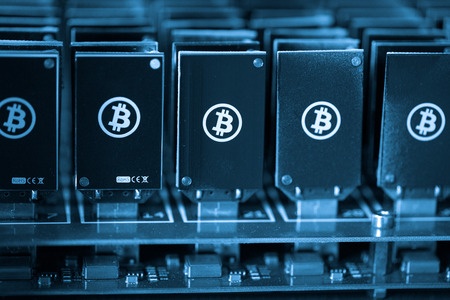 Much ado about nothing?
Much ado about nothing?
Despite the long drawn endeavor, the world’s first bitcoin mining IPO was lackluster. Australia’s The Bitcoin Group, a bitcoin mining company raised $4.2 million (5.9 million Australian dollars) falling short of the targeted $14 million (20 million Australian dollars)
The Melbourne-based company was founded in September 2014 with plans to pursue an IPO a month later. The founders Sam Lee, Allan Guo and Ryan Xu started Bitcoin Group as a cryptocurrency arbitrage service, but soon turned their attention to mining bitcoins as the main business.
However, the IPO plans did not pan out as expected after the Australian Securities and Investments Commission banned the company for trying to garner investor interest on social media before filing the prospectus and placing two more stop orders on the IPO in July.
The Bitcoin Group was finally cleared to list on the Australian Securities Exchange in January this year after a third unsuccessful attempt of listing in November last year. The stock ‘BCG’ was scheduled to begin trading on February 2nd and received an underwhelming response from the market. As of now, it still hasn’t actually been listed.
All the setbacks however did not dampen the founders’ spirit — CEO Sam Lee called the IPO a “solid result” and told CNBC that it was sufficient for the company to focus on expansion by acquiring new mining equipment.
Bet On the Iowa Caucus and Political Primaries With Bitcoins
January 31, 2016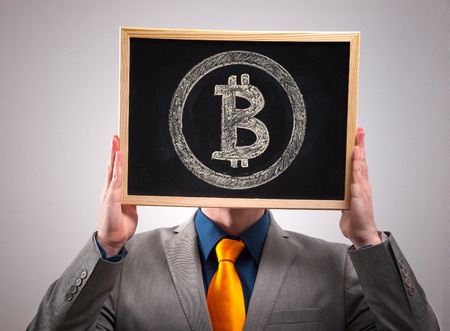 I’m often asked if bitcoin still has a future or if it’s dead. As someone who has mined bitcoins, made purchases with them, sold advertising space with them, traded them, and contributed to political campaigns with them, I feel pretty confident that bitcoins are here to stay. While the system isn’t as anonymous as some people believe, bitcoin fills a void that many people the world over have long sought, a way to move money outside the banking system, and all without a replacement form of centralized control. It is the only way to truly de-bank.
I’m often asked if bitcoin still has a future or if it’s dead. As someone who has mined bitcoins, made purchases with them, sold advertising space with them, traded them, and contributed to political campaigns with them, I feel pretty confident that bitcoins are here to stay. While the system isn’t as anonymous as some people believe, bitcoin fills a void that many people the world over have long sought, a way to move money outside the banking system, and all without a replacement form of centralized control. It is the only way to truly de-bank.
The value is volatile but there are several markets where such volatility is the cost of doing business. Would you rather your bitcoins be worth 5% less when you receive them as payment or would you rather get nothing of what you are owed because the traditional banking system is preventing the transaction?
Enter one black market, betting on US elections, a practice that is largely illegal. And if people could bet on it they would, according to odds maker Jimmy Vaccaro at the South Point Casino in Las Vegas. He told CNN that opening up betting on elections would be the biggest thing they’d ever booked. “It would make the Super Bowl look like a high school football game,” he reportedly said.
But you can still bet on elections if you really want to, according to Market Watch’s Brett Arends. In the name of journalism, Arends successfully bet $1 on the Iowa Caucus… using bitcoins. He bet on Rand Paul with 40 to 1 odds. If he wins, he’ll collect those winnings in bitcoins.
And nobody can stop him.
As an independent system controlled by nobody, there are no bank accounts to freeze, ACH processors to shut down or physical dollars to confiscate. And despite the critics that claim bitcoins have to be converted to a “real” currency at some point in order to realize the value, that’s not necessarily true. You can live your life on bitcoin.
For one bookmaker (and you should view it as a reference only), the odds of a Ted Cruz win in the Iowa caucus is 2.6 to 1. Marco Rubio is paying 10.5 to 1. On the Democrat side, Bernie Sanders is paying 2.92 to 1.
Market Watch’s Arends argues that such activity might not be gambling at all since the IRS ruled bitcoin to be property, not a currency. In his simplistic view, they might as well be digital jelly beans. “When I wagered $1 worth of bitcoins on Sen. Paul last week, in the eyes of the law I wasn’t actually betting real money. I was just betting jelly beans,” he wrote.
You can of course buy cool stuff with those jelly beans.
It’s quite gray indeed, but if the interest in political gambling truly dwarfs the Super Bowl, then a totally bank-less decentralized system opens up all kinds of doors, the kind that don’t want to be closed.
In non-bank finance, a topic I often write about, all roads inevitably lead back to banks, no matter how much the system is disrupted. The truly de-banked use bitcoins and with that, the possibilities with it are endless.
Would you bet on Bernie Sanders with 2.92 to 1 odds? You’re not supposed to be able to do it, but in a bankless world, you could.
Rand Paul Speaks at Bitcoin Event
April 20, 2015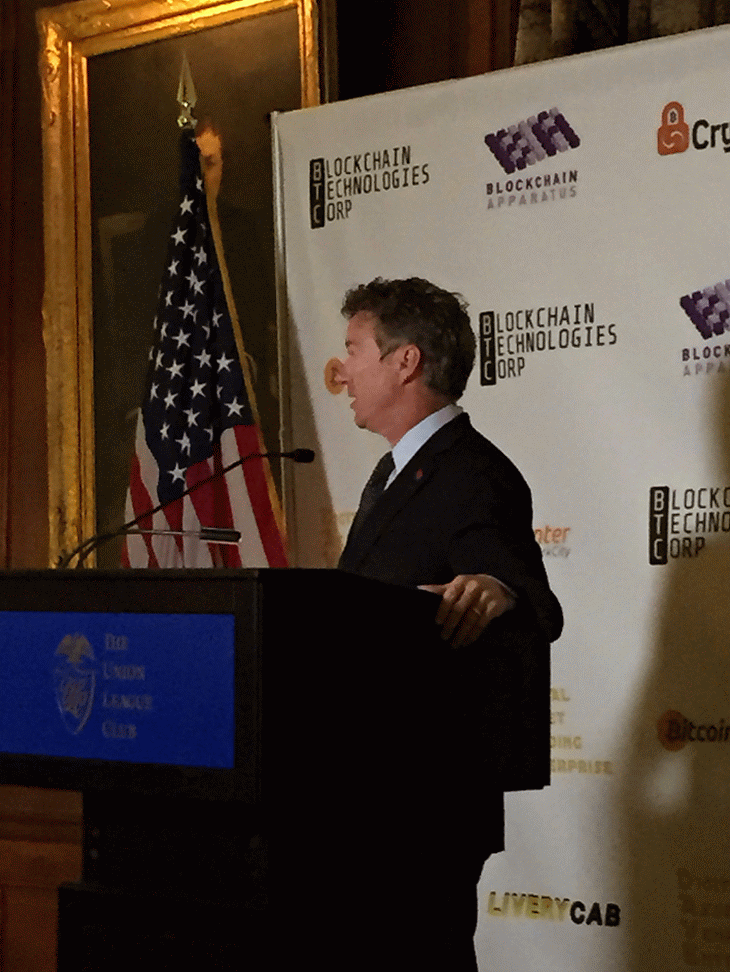 Yesterday, Senator Rand Paul spoke at a private Bitcoin event produced by Blockchain Technologies Corp in Midtown Manhattan. It was a gathering of monetary technophiles dressed in their Sunday best.
Yesterday, Senator Rand Paul spoke at a private Bitcoin event produced by Blockchain Technologies Corp in Midtown Manhattan. It was a gathering of monetary technophiles dressed in their Sunday best.
Paul’s main reason for supporting the Bitcoin movement/technology/currency was the ability to bypass the expensive fees tacked on by credit and debit card issuers. A business that only had a 3 or 4% profit margin could double its profits by eliminating merchant processing fees, he said.
The event lasted for about two hours with Paul only making an appearance for about 15 to 20 minutes.
Rand Paul Accepts Bitcoin
April 7, 2015 Bitcoin’s got a real fan! Senator Rand Paul is now accepting bitcoin as one way to attract donations for his presidential campaign. And regardless of whether or not you agree with his views, I did at the very least make a donation on the basis that I am a believer in bitcoin.
Bitcoin’s got a real fan! Senator Rand Paul is now accepting bitcoin as one way to attract donations for his presidential campaign. And regardless of whether or not you agree with his views, I did at the very least make a donation on the basis that I am a believer in bitcoin.
Donating to Paul’s campaign by bitcoin is one of three payment options. The other two are credit card and paypal. He is able to accept bitcoin via BitPay, a company I just mentioned a few days ago.
How would I describe the experience of donating to Rand Paul for president using bitcoin?
Insanely simple!
By law, Paul will have to convert any bitcoins received into dollars before using them. Too bad…
BitPay Right at Home at Transact ’15
April 3, 2015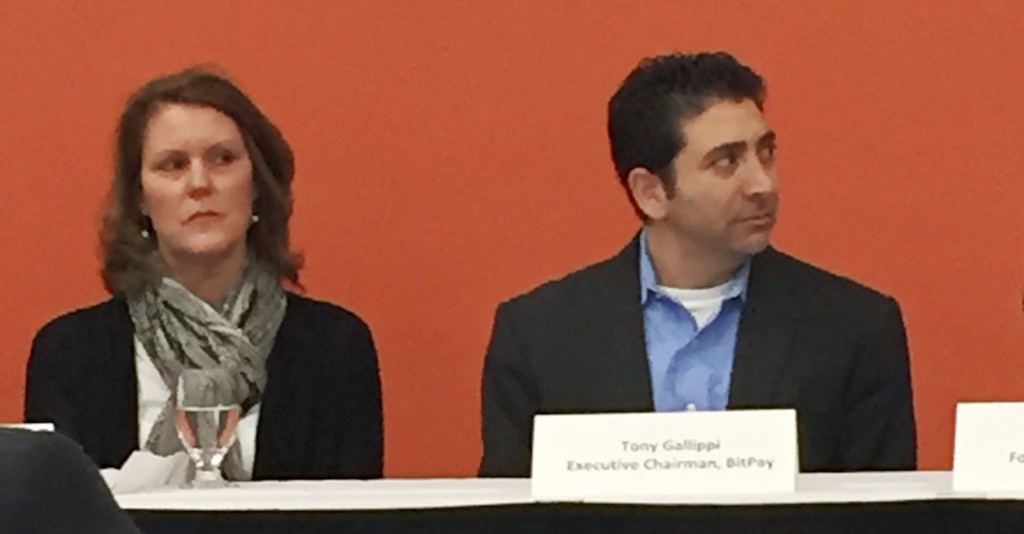 BitPay has a knack for flair. They sponsored a college bowl game known as The Bitcoin Bowl in St. Petersburg as well as a driver in the NASCAR Camping World Truck Series race. BitPay is bitcoin, but all grown up.
BitPay has a knack for flair. They sponsored a college bowl game known as The Bitcoin Bowl in St. Petersburg as well as a driver in the NASCAR Camping World Truck Series race. BitPay is bitcoin, but all grown up.
As a member of the ETA and with a business model similar to just about every other card processing acquirer, BitPay didn’t really look too out of place. At a press briefing on April 1st at Transact ’15, company co-founder Tony Gallippi sat in between Osama Bedier of Poynt and Joan Herbig of ControlScan to discuss the road ahead for payments.
Gallipi explained that they are working to integrate with POS platforms so that merchants can accept bitcoin using their existing systems. He also sought to dispel the myth that bitcoin is an untraceable currency by citing the bombshell news report published by the New York Times just the day earlier that revealed government agents had been caught stealing bitcoins.
“The agents, Carl Mark Force IV, who worked for the Drug Enforcement Administration, and Shaun W. Bridges, who worked for the Secret Service, had resigned amid growing scrutiny, and on Monday they were charged with money laundering and wire fraud,” The story states. The agents stole bitcoins recovered in the Silk Road case and laundered it. But since bitcoin is the perfect opposite of untraceable, both agents were caught.
Bitcoiners, start your engines! BitPay #NASCAR driver @jbossracing now starting his 1st lap at Daytona! #JBossBitcoin pic.twitter.com/Bzq4rYY8IC
— BitPay (@BitPay) February 21, 2015
Referring later to the phenomenon of using your mobile device to make a payment, Gallippi said, “a lot of the difficulty in changing is just muscle memory. We’re all so used to just reaching for our wallet to make a payment.”
While BitPay wore a good corporate face for the conference, news that their sponsorship of future college bowl games had been terminated hit the press right in the middle of it. According to Fortune, “neither side is talking about the abruptly ended sponsorship, but it likely has to do with the value of the game, and the value of bitcoin.”
That doesn’t sound good for BitPay, but it may have come down to whether or not it was a good use of their marketing budget. For one, their company name wasn’t even attached to the bowl title. It was the Bitcoin Bowl not the BitPay Bowl. But at least their one run was a moment to remember.
Hopefully BitPay will still be going strong at Transact ’16 next year.
deBanked Inks Deal with Lenders Marketing in Bitcoin
March 10, 2015 deBanked has inked an advertising deal with Lenders Marketing, a company that provides trigger leads to the business financing industry. The deal is significant because it was priced in Bitcoin, not dollars.
deBanked has inked an advertising deal with Lenders Marketing, a company that provides trigger leads to the business financing industry. The deal is significant because it was priced in Bitcoin, not dollars.
“Bitcoin’s value against the dollar is volatile,” said deBanked’s Sean Murray. “But 1 BTC today is still equal to 1 BTC tomorrow.”
deBanked does convert a portion of its Bitcoin revenue into dollars, but holds the rest. “I think it’s important to practice what you preach,” Murray added. “What better way is there to debank than by using Bitcoin as a currency?”
Lenders Marketing and deBanked used Coinbase to transact, the country’s first regulated Bitcoin exchange.
deBanked’s March/April print magazine issue will be distributed in the mail at the end of this month. Anyone can subscribe to receive it for FREE.
Lender’s Marketing monitors business credit databases, credit card processing companies, financial institutions, government and public filings and merges them with their own database to provide a real-time reflection of current business loan needs.
In the upcoming magazine issue, you will literally be able to smell the leads. You’ll have to hold a copy in your hand to find out what that means.
Federal Government Selling Bitcoins
February 18, 2015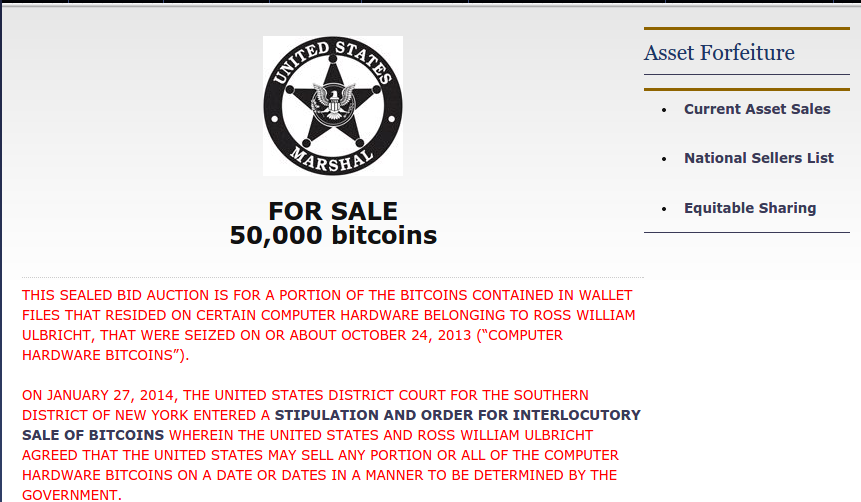 If the webpage didn’t say www.usmarshals.gov in the address bar, it’d look like a poorly disguised scam. The page, which looks like it came out of the 1990s (no SSL either for a government website?) is offering 50,000 bitcoins for sale, an amount worth $11.8 million at current market prices.
If the webpage didn’t say www.usmarshals.gov in the address bar, it’d look like a poorly disguised scam. The page, which looks like it came out of the 1990s (no SSL either for a government website?) is offering 50,000 bitcoins for sale, an amount worth $11.8 million at current market prices.
This sealed bid auction is for 50,000 bitcoins separated into two series: Series A (10 blocks of 2,000 bitcoins), and Series B (10 blocks of 3,000 bitcoins). You will not have the opportunity to view other bids. You will not have the opportunity to change your bid once submitted.
Bidding ends at Noon on March 2nd and in order to bid you have to wire the U.S. Marshals at least $100,000 upfront just to be considered a legitimate bidder.
The old fashion system instructs bidders to email them their driver’s license, completed bidder form, and receipt that says they wired them a hundred grand. There’s a special email address to do this and they should hear back from someone if they get approved.
I bet you never thought you’d seen an email address like this, USMSBitcoins@usdoj.gov.
So why are the U.S. Marshals in the Bitcoin business? Surely you know about Silk Road already…
If you want to get in but don’t have enough to cover a lavish bid, why not syndicate it out? That’s allowed:
Can I form a syndicate of buyers?
The person or entity that registers to bid on this auction must satisfy all registration requirements, including certifying that the bidder is not acting in concert with the defendant or defendant entity. This certification extends and applies to all members of a syndicate. The primary bidder should perform whatever due diligence the bidder feels is necessary in order to comfortably make that certification.
And if you don’t win, the Marshals will just ACH your deposit back, but not until after they’ve probably put you on some kind of watch list. Nothing says suspicious person like randomly wiring 100k+ to the U.S. Marshals just so you can be considered a bitcoin bidder. Expect them to be curious about who you are.
Hopefully their technology is more advanced than the way their website looks though.
A Bitcoin Moment
February 1, 2015 I had a moment recently. It was late at night and I was ready to hit the hay.
I had a moment recently. It was late at night and I was ready to hit the hay.
“Oh wait, there’s something I need to get out of the way,” I told myself.
I had kept delaying the purchase of a new printer cord to replace the one I mangled. It was time to end that procrastination now! Even though it was 1 AM, I was sure that it would only take a few minutes to place an online order and I summoned the motivation to go for it.
Addicted to Amazon’s 1-Click ordering feature, I was bummed to discover they didn’t have the cord I needed. With no time to waste, I used Google to find a site that did carry it.
Found one.
Add to shopping cart.
Select payment method.
Ugh…
I didn’t have my credit card number memorized and I looked across the unlit room to see if my wallet lay nearby. It was somewhere in a pile on the coffee table, or maybe it was upstairs, or maybe I left it in my pants pocket. Unsure and too tired, I selected PayPal to speed things up, a service I hadn’t used in a while.
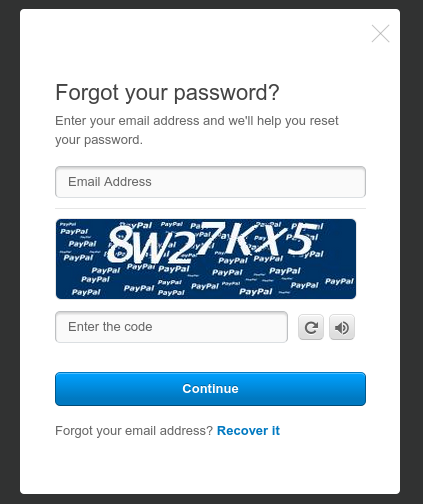 Incorrect password.
Incorrect password.
Ugh…
I entered my email address and completed a captcha.
No email…
Refresh email.
Still nothing.
Refresh email again.
Nothing.
Agitated, I started Googling for help about not receiving a PayPal password reset email and instead ended up on a message board where people griped about PayPal in general.
After perusing that forum like a zombie, I got up and walked around. My wallet wasn’t downstairs or at least I couldn’t find it.
Thirty six minutes had gone by since I first encountered the checkout screen. I stopped caring about the cord and I resolved to never print anything ever again.
Before shutting down the computer for the night, I checked my phone. The only news alert I had was about bitcoin. I laughed out loud and went back to the checkout screen. Bitcoin was a payment option. I selected it, copied and pasted the payment address and sent bitcoins stored on my computer to it.
Order placed.
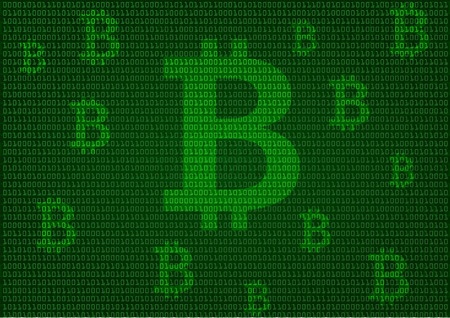
—–
tl;dr
I needed to buy a cord online. Credit card was out of reach. PayPal password was forgotten. Bitcoin saved Gotham.






























